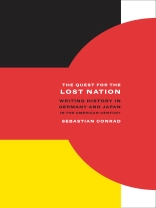Highly praised when published in Germany, The Quest for the Lost Nation is a brilliant chronicle of Germany’s and Japan’s struggles to reclaim a defeated national past. Sebastian Conrad compares the ways German and Japanese scholars revised national history after World War II in the shadows of fascism, surrender, and American occupation. Defeat in 1945 marked the death of the national past in both countries, yet, as Conrad proves, historians did not abandon national perspectives during reconstruction. Quite the opposite—the nation remained hidden at the center of texts as scholars tried to make sense of the past and searched for fragments of the nation they had lost. By situating both countries in the Cold War, Conrad shows that the focus on the nation can be understood only within a transnational context.
Tabla de materias
Contents
Introduction
1. Mapping Postwar Historiography in Germany and Japan
2. The Origin of the Nation: Bismarck, Meiji Ishin, and the Subject of History
3. The Nation as Victim: Writing the History of National Socialism and Japanese Fascism
4. The Invention of Contemporary History
5. The Temporalization of Space: Germany and Japan between East and West
6. History and Memory: Germany and Japan, 1945–2
Notes
Bibliography
Acknowledgments
Index
Sobre el autor
Sebastian Conrad is Professor of History at the European University Institute in Florence. Conrad is also the author of Globalisation and Nation in Imperial Germany and has edited, together with Dominic Sachsenmaier, Competing Visions of World Order: Global Moments and Movements, 1880s-1930s.












